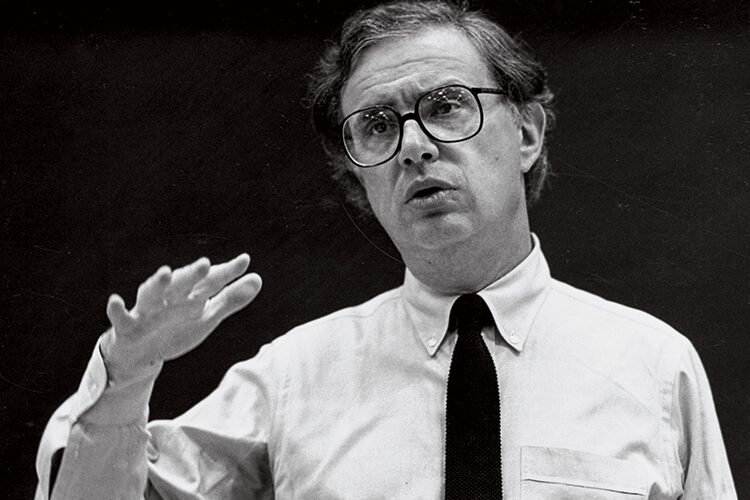Sept. 27, 1935–Jan. 21, 2021
From a young age, Kirk Raab ’59 combined worldliness and an aptitude for business with an appreciation for art, education, and community. Born in New York City, Raab turned his attention to upstate New York when he began his Colgate journey in 1952.
In college, Raab balanced his interest in global business through his participation in the Student Government Association, International Relations Council, and Debate Society with more community-oriented endeavors, including the Maroon, Glee Club, and Konosioni.
After two years, Raab left campus to serve in Germany as a U.S. Army corporal during the Korean War. When he returned to Colgate two years later, a glimmer of his business savvy emerged. He continued his Colgate education with help from an unlikely source — the New York Times and Herald Tribune campus franchises. Raab negotiated a deal to deliver newspapers on campus and in Hamilton, acquiring the funds to study fine arts and secure his political science degree in 1959.
Raab went on to a successful career in the biopharmaceutical industry, starting with a job in sales with Pfizer, Inc. From there, he worked his way up — spending time in Mexico with A.H. Robbins before stints as vice president, Latin America for the Beecham Group and as vice president, Latin America, executive vice president, president, COO, and director for Abbott Laboratories. With a reputation for leadership, Raab spent the rest of his career helping biopharma companies expand and succeed in the marketplace.
In 1985, Raab joined Genentech as president, COO, and a member of the Board of Directors before becoming the CEO five years later. He proved pivotal to the company’s growth and successfully guided it through the approval of a half dozen drugs, including several cancer treatments. When he left Genentech in 1995, he proceeded to serve more than 20 biotechnology companies, including Follica, Oxford Glycosciences, and Medgenics in Israel, in advisory, interim CEO, and board member roles.
Raab’s leadership and philanthropy extended to the Colgate community. He served on the Board of Trustees, named an endowed biology scholarship in 1987, and established the Raab Family Chair in biology in 1999. Notably, in 2011, Raab and his wife made a donation that allowed for the renovation of the president’s house, in part helping reduce the University’s carbon footprint. The 1962 structure, previously called Watson House, was renamed Raab House in commemoration.
Outside of the office, Raab’s life was filled with an appreciation for fine art and community building. His fine arts studies served him well as a member of the Board of Trustees for the Art Institute of Chicago and Chicago Botanical Gardens; director of the National Science and Technology Medals Foundation; and trustee of the San Francisco Ballet, the San Francisco Symphony, Golden Gate Planned Parenthood, and San Francisco Public Radio and Television.
Globally, he was the publisher of the Mexican American Chamber of Commerce Review and a member of the Chancellor’s Court of Benefactors and Honorary Fellow at Oxford University’s Exeter College.
Whether stationed in Germany, working in Mexico at the start of his career, providing business advice in Israel at the end of his career, or returning to a Hamilton, N.Y., campus he helped shape, Raab was a master of the art of opportunity.
“He was a big, strong presence wherever he was; thoughtful, generous, with an untiring intellect,” his wife, Maryann, told the New York Times. “He would always say, ‘I have a wonderful life.’ And he did.”
At 84 years old, Raab passed away in Palm Springs, Calif. He is survived by his wife; 6 children, including Dean ’12 and Julia ’12; and many grandchildren.

